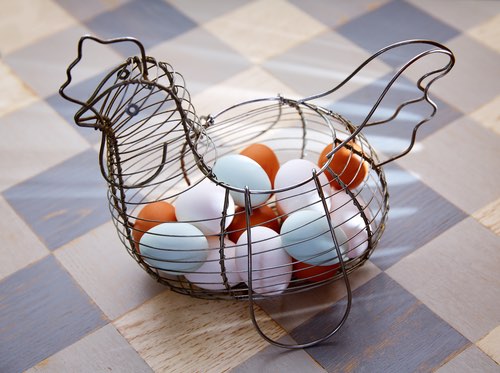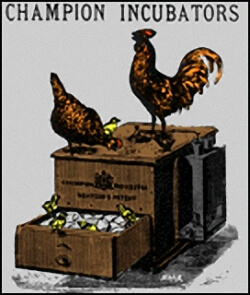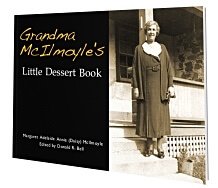- Home
- Recipe Help & Misc
- Using Raw Eggs in Recipes
Using Raw Eggs In Recipes
Using raw eggs in recipes has become a modern health concern. Some of Grandma's old no-bake dessert and beverage recipes call for raw eggs or uncooked egg whites, and care must be taken because of the link between raw eggs and salmonella.
Below you will find IMPORTANT INSTRUCTIONS for adapting the old fashioned recipes to modern, safe cooking practices.
Is It Safe to Use Raw Eggs In Recipes?
© 2004 by Don Bell
 Practice Raw Egg Safety When Using No-Bake Recipes
Practice Raw Egg Safety When Using No-Bake Recipes(Source: ©lunamarina/Depositphotos.com)
First, the good news. Making homemade beverages like eggnogs and vintage egg creams and desserts such as no bake squares, puddings, and custard ice creams can be a safe and rewarding experience simply by taking a few precautions when using raw eggs in recipes.
When Grandma's dessert recipes were first published in the 19th century, it was safe for people to eat foods that contained raw eggs. No one ever gave a thought about a possible link between raw eggs and salmonella nor was anyone concerned about using raw eggs in recipes.
However, a strain of Salmonella bacteria called enteritidis found its way into the ovaries of chickens and eventually into their eggs during the latter half of the 20th century. These bacteria can also be placed on the outside of the shell as it exits the hen's body.
Eggs with Salmonella look and taste entirely normal, and it is very difficult to tell which eggs are infected. It's even difficult to know how many are infected.
Depending on what reports you read, experts estimate from one in every 700 to one in every 20,000 eggs are infected with the bacterium Salmonella enteritidis; that's concerning.
The Risk of Using Raw Eggs In Recipes
 Vintage Incubator
Vintage Incubator(Source: Don Bell)
Although the risk of getting an infected egg is somewhat low, the odds are that you will eventually get one. For some, eating that wrong egg can simply mean an upset stomach or uncomfortable diarrhea, but for others the results can prove much worse, and in rare situations salmonella food poisoning can be life threatening.
Those at most risk include young children, pregnant mothers, unborn babies, the elderly, and people with impaired immune systems. Taking simple precautions when using raw eggs in recipes should be taken seriously.
Because of the salmonella risk, Canadian and United States government agencies recommend that people do not to eat raw eggs or uncooked food made from them.
In their fact sheet titled Egg Products Preparation, the Food Safety and Inspection Service (FSIS) of the United States Department of Agriculture (USDA) has recommended the following:
"No one should eat foods containing raw eggs. This includes … foods like homemade mayonnaise, ice cream, or eggnog made from recipes in which the egg ingredients are not cooked."
Therefore, according to experts, It is no longer worth the risk to consume raw egg products!
How to Be Safe From Salmonella
 How to Use Raw Eggs In Recipes and Avoid Salmonella
How to Use Raw Eggs In Recipes and Avoid Salmonella(Source: ©wanatithan/Depositphotos.com)
All raw eggs and egg-containing foods must be cooked to reach 160°F (71°C). Recipes that call for uncooked eggs must be adapted to use precooked eggs.
The only other safe alternative is to use pasteurized egg products or egg substitutes.
Egg Substitutes
Egg substitutes are an available alternative to raw eggs.
Egg Replacer™
A Powdered, egg-free vegetarian product to replace eggs in most recipes. This product brand is sold at some food stores. Camping and wilderness outfitters often carry similar brands.
Whipped Cream
Whipped cream may be freely substituted for whipped egg whites in many recipes.
Pasteurized Egg Products
Pasteurized egg products are an excellent alternative to raw eggs.
Pasteurized Eggs
The eggs are pasteurized right in the shell using patented all-natural processes to kill the bacteria effectively so that salmonella is no longer an issue.
Pasteurized eggs are completely safe to use uncooked; however, they are not widely available in food stores yet.
Powdered Eggs, Egg Yolks and Egg Whites
These products are pasteurized and are a good substitute when uncooked eggs, egg yolks, or egg whites are called for in a recipe. You can whip reconstituted egg white powder similar to fresh egg white.
These products are sold at some food stores along with supplies for cake baking. Camping and wilderness outfitters may also sell powdered egg products.
Refrigerated Liquid Eggs and Egg Whites
These products are pasteurized and are an excellent substitute when uncooked eggs or egg whites are called for in a recipe. They are sold at most food stores along with refrigerated dairy products. Their cost is very reasonable, and the products are quite good.
One brand sold at our local supermarket packages two 250-mL (1-cup) containers of liquid eggs in a small carton. Since each 250-mL container holds the equivalent of 5 whole eggs, you get the equivalent of 10 eggs in a carton for around the same cost as one dozen fresh Grade-A Eggs.
Each 250-mL container of liquid egg whites holds the equivalent of 8 egg whites, so you actually get the equivalent of 16 egg whites in a carton for around the same cost as one dozen fresh Grade-A Eggs.
How to Adapt Your Recipes
Since using raw eggs in recipes is considered unsafe, and since some old fashioned no-bake recipes call for raw eggs or uncooked egg whites, to avoid any risk associated with raw eggs and salmonella you need to adapt your recipes as follows:
How to Precook Whole Eggs
You may precook the eggs in a saucepan by combining them with either some sugar or liquid from the recipe. Cook over a low heat, stirring constantly, until the egg mixture reaches 160°F (71°C) or coats a metal spoon or the blade of a knife with a thin film.
Once the egg mixture is cooked, place the saucepan in cold water and continue to stir until the mixture is cool, and then proceed with the recipe.
Note: As an alternative, you may substitute powdered eggs or refrigerated liquid eggs by carefully following the package directions. Both products are pasteurized and may be used in recipes like regular eggs.
How to Precook Egg Yolks
You may precook the egg yolks in a saucepan by combining the yolks with some liquid from the recipe. Cook over a low heat, stirring constantly, until the yolk mixture reaches the temperature of 160°F (71°C) or coats a metal spoon or the blade of a knife with a thin film.
Once the yolks are cooked, place the saucepan in cold water and continue to stir until the mixture is cool, and then proceed with the recipe.
Note: As an alternative, you may substitute powdered egg yolks or refrigerated liquid eggs by following the package directions. Both products are pasteurized and may be used in recipes like regular eggs, thereby eliminating any concerns about salmonella.
How to Precook Egg Whites
Grandma's Tip
Whipped cream also serves as an excellent substitute for egg whites in some recipes, thereby eliminating any concerns about using raw eggs in recipes.
You may precook the egg whites carefully in a saucepan by combining the whites with some sugar and water from the recipe. Cook over low heat, beating constantly, until the egg white mixture reaches 160°F (71°C).
Pour into a bowl and beat rapidly until the whites stand in soft peaks. You must use some sugar with the whites to keep them from coagulating too quickly.
Unfortunately, there is no way to look at the eggs and tell when they are done, so you must use a cooking thermometer if you want to ensure accuracy.
Note: As an alternative, you may substitute powdered egg whites or refrigerated liquid egg whites by following the package directions. Both products are pasteurized and may be whipped and used in recipes like regular egg whites.
In recipes where many egg whites are called for, refrigerated liquid egg white is the best alternative to using whole eggs, since there are no yolks to waste or use.
When it Comes to Using Raw Eggs In Recipes, It's Better to Be Safe
I hope you've found the information about using raw eggs in recipes helpful, especially when Grandma's old fashioned dessert and beverage recipes call for the use of raw eggs.
Remember: It's better to be safe than sorry!

Sign Up now for GRANDMA'S DESSERT CLUB and download your FREE PDF COPY of Grandma McIlmoyle's Little Dessert Book. Also receive my regular Bulletin featuring classic recipes and nostalgia.











